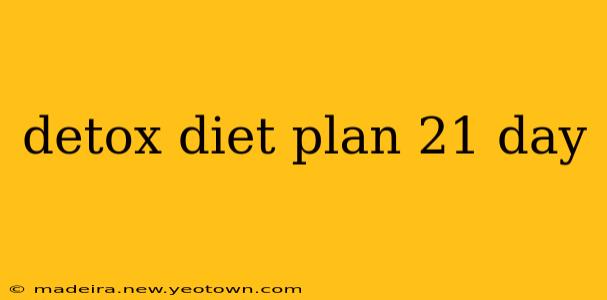Let's be honest, we all crave that feeling of lightness and renewed energy. The constant barrage of processed foods, environmental toxins, and stress can leave us feeling sluggish and depleted. A 21-day detox diet plan isn't about drastic measures or starvation; it's a gentle, guided journey toward revitalizing your body and mind. Think of it as a spring cleaning for your inner self. This isn't a quick fix, but a sustainable approach to healthier living. My journey with detoxing began with a feeling of overwhelming fatigue, and the changes I made were transformative. Let me share what I learned and what a successful 21-day plan might look like for you.
What is a Detox Diet?
A detox diet focuses on eliminating processed foods, refined sugars, and other harmful substances while emphasizing nutrient-rich whole foods. It's about supporting your body's natural detoxification processes—the liver, kidneys, and lymphatic system—to efficiently cleanse and eliminate waste. It's not about "detoxifying" from specific toxins in the medical sense (your body already has incredible mechanisms for that), but rather about giving your system the best possible support to function optimally.
What to Expect During Your 21-Day Detox
The first few days might involve some initial discomfort. Headaches, fatigue, or mild digestive upset are possible as your body adjusts to the change. This is often referred to as "detox symptoms," and they usually subside within a few days. Staying hydrated is key! Drink plenty of water, herbal teas, and even infused water with lemon or cucumber. As you progress, you'll likely experience increased energy levels, clearer skin, improved digestion, and a heightened sense of well-being. Remember, this is a marathon, not a sprint. Listen to your body and adjust as needed.
Sample 21-Day Detox Diet Plan: A Flexible Framework
This plan provides a general framework. Feel free to customize it based on your preferences, dietary needs, and available ingredients. Remember to consult your doctor before making significant dietary changes, especially if you have underlying health conditions.
Week 1: Foundation Phase
Focus on eliminating processed foods, refined sugars, caffeine, and alcohol. Introduce plenty of fruits, vegetables, and whole grains.
- Breakfast: Oatmeal with berries and nuts, smoothie with spinach, banana, and almond milk.
- Lunch: Large salad with grilled chicken or fish, lentil soup with whole-grain bread.
- Dinner: Baked salmon with roasted vegetables, chicken stir-fry with brown rice.
Week 2: Deep Cleanse Phase
Increase your intake of liver-supporting foods like cruciferous vegetables (broccoli, kale, cauliflower), beets, and leafy greens. Incorporate more fiber-rich foods to support healthy digestion.
- Breakfast: Chia seed pudding with fruit, scrambled eggs with spinach.
- Lunch: Quinoa salad with chickpeas and vegetables, vegetable curry with brown rice.
- Dinner: Lentil stew with whole-grain bread, turkey meatballs with zucchini noodles.
Week 3: Reintegration Phase
Gradually reintroduce healthy fats (avocado, nuts, seeds) and lean proteins. Continue to prioritize whole, unprocessed foods.
- Breakfast: Smoothie with protein powder, berries, and spinach, yogurt with granola and fruit.
- Lunch: Salad with grilled tofu or tempeh, leftover dinner from the previous night.
- Dinner: Chicken and vegetable skewers with sweet potato fries, vegetarian chili with cornbread.
What Foods to Include in Your Detox Diet?
- Fruits and vegetables: These are packed with vitamins, minerals, and antioxidants. Aim for a rainbow of colors to maximize the range of nutrients.
- Lean proteins: Chicken, fish, beans, lentils, and tofu provide essential amino acids for building and repairing tissues.
- Whole grains: Brown rice, quinoa, oats, and barley offer sustained energy and fiber.
- Healthy fats: Avocado, nuts, seeds, and olive oil are crucial for hormone production and brain function.
- Plenty of water: Hydration is essential for flushing out toxins and supporting bodily functions.
What Foods to Avoid During Your Detox
- Processed foods: These are often high in unhealthy fats, sugars, and additives.
- Refined sugars: Limit added sugars found in candy, soda, and processed foods.
- Caffeine: This can dehydrate you and interfere with sleep.
- Alcohol: This can stress your liver and interfere with detoxification.
- Artificial sweeteners: Studies raise concerns about the long-term health effects of these.
How Much Exercise Should I Do During a Detox?
Light to moderate exercise is beneficial during a detox. Activities like yoga, walking, or swimming can help to boost circulation and lymphatic drainage. Listen to your body; rest when you need to.
Will I Lose Weight on a Detox Diet?
Weight loss is a possible side effect of a detox diet, but it’s not the primary goal. The focus should be on improving overall health and well-being. Any weight loss is usually a result of eliminating processed foods and refined sugars, promoting healthier eating habits.
Is a 21-Day Detox Diet Right for Me?
A 21-day detox diet can be a beneficial way to reset your eating habits and support your body's natural cleansing processes. However, it's crucial to listen to your body, consult with your doctor or a registered dietitian before starting, and make sure it aligns with your individual health needs and goals. A sustainable approach to healthy eating, rather than a temporary "fix", is key for long-term well-being. Remember, this journey is about nurturing yourself from the inside out.

